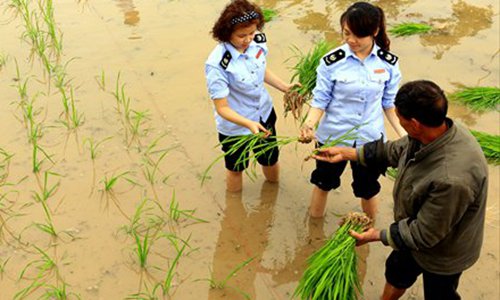HOME >> CHINA
China to regulate civil servants with stricter administrative punishments
By Wang Qi Source:Global Times Published: 2019/10/9 23:58:57

Two newly recruited civil servants (left) learn techniques for planting rice from a local farmer in Guang'an, Sichuan Province, on April 24. It was a part of their training to get closer to the people. Photo: CFP
China will release a draft law for administrative punishment of civil servants, which experts see as a move to help establish a rule of law-based society.
The draft was released on the official website of China's National People's Congress on Tuesday to solicit public opinion.
According to China's National People's Congress, the draft law, which will apply to all civil servants and employees in public spheres, including civil servants at administrative organs and employees of state-owned companies and public institutions.
The punishments stipulated in the draft include warnings, demerits, demotion and dismissal.
These punishments are much more severe than previous disciplinary measures, Zhi Zhi Zhenfeng (is that right?), a legal expert at the Chinese Academy of Social Sciences, told the Global Times on Wednesday.
"The law will be a part of China's law for administrative supervision," Zhi said.
Besides corruption and abuse of power, the draft law also covers moral and ethical behavior.
Civil servants who deliberately put obstacles in the masses' way, who abuse and abandon family members or refuse to take family responsibilities like taking care of the elderly and bringing up children will be severely punished, the draft said.
Fraud, fabricating academic credentials and illegal outbound ( outbound what? travel?) are banned as well, according to the draft.
It shows China's determination to establish an excellent contingent of officials with integrity and patriotism and is a vital move for the structural reform of our system of supervision and legal system, Zhi noted.
"Public employees and civil servants are the backbone of our country. The law not only provides a legal basis for discipline inspection, but also pushes officials to be stricter with themselves," an anonymous official who works for the commission for discipline inspection at a Beijing-based state-owned enterprise, told the Global Times on Wednesday.
Posted in: SOCIETY